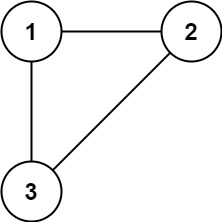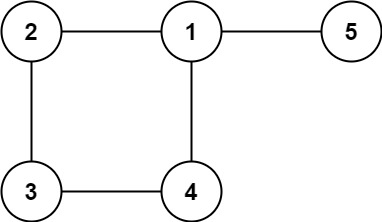
g0601_0700.s0684_redundant_connection.Solution Maven / Gradle / Ivy
Go to download
Show more of this group Show more artifacts with this name
Show all versions of leetcode-in-java21 Show documentation
Show all versions of leetcode-in-java21 Show documentation
Java-based LeetCode algorithm problem solutions, regularly updated
package g0601_0700.s0684_redundant_connection;
// #Medium #Depth_First_Search #Breadth_First_Search #Graph #Union_Find
// #2022_03_22_Time_0_ms_(100.00%)_Space_42.7_MB_(76.10%)
/**
* 684 - Redundant Connection\.
*
* Medium
*
* In this problem, a tree is an **undirected graph** that is connected and has no cycles.
*
* You are given a graph that started as a tree with `n` nodes labeled from `1` to `n`, with one additional edge added. The added edge has two **different** vertices chosen from `1` to `n`, and was not an edge that already existed. The graph is represented as an array `edges` of length `n` where edges[i] = [ai, bi] indicates that there is an edge between nodes ai and bi in the graph.
*
* Return _an edge that can be removed so that the resulting graph is a tree of_ `n` _nodes_. If there are multiple answers, return the answer that occurs last in the input.
*
* **Example 1:**
*
* 
*
* **Input:** edges = \[\[1,2],[1,3],[2,3]]
*
* **Output:** [2,3]
*
* **Example 2:**
*
* 
*
* **Input:** edges = \[\[1,2],[2,3],[3,4],[1,4],[1,5]]
*
* **Output:** [1,4]
*
* **Constraints:**
*
* * `n == edges.length`
* * `3 <= n <= 1000`
* * `edges[i].length == 2`
* * 1 <= ai < bi <= edges.length
* * ai != bi
* * There are no repeated edges.
* * The given graph is connected.
**/
public class Solution {
private int[] par;
public int[] findRedundantConnection(int[][] edges) {
int[] ans = new int[2];
int n = edges.length;
par = new int[n + 1];
for (int i = 0; i < n; i++) {
par[i] = i;
}
for (int[] edge : edges) {
int lx = find(edge[0]);
int ly = find(edge[1]);
if (lx != ly) {
par[lx] = ly;
} else {
ans[0] = edge[0];
ans[1] = edge[1];
}
}
return ans;
}
private int find(int x) {
if (par[x] == x) {
return x;
}
return find(par[x]);
}
}
© 2015 - 2025 Weber Informatics LLC | Privacy Policy